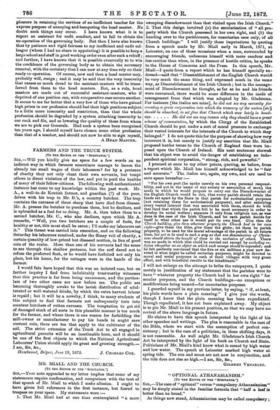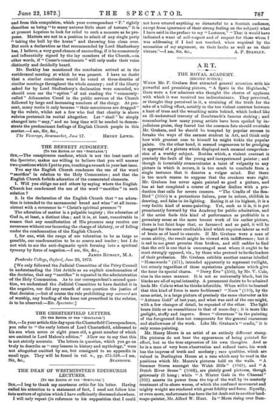"OPTIONAL ATEIANASIANISM."
[TO THE EDITOR OF THE "SPECTATOR."] SIR,—The case of "optional" versus "compulsory Athanasianism" may be simply stated in the familiar formula that "half a loaf is better than no bread."
As things now stand, Athanasianism may be called compulsory ;
and from this compulsion, which your correspondent "F." rightly describes as being "to many natures little short of torture," it is at present hopeless to look for relief to such a measure as he pro- poses. Matters are not in a position to admit of any single party 44 taking the bull by the horns" and throwing him clean over. But such a declaration as that recommended by Lord Shaftesbury has, I believe, a very good chance of succeeding, if it be numerously and influentially signed by the lay members of the Church,—in other words, if " Cassar's constituents" will only make their voice .distinctly and decidedly heard.
Mr. Berkley has mentioned the conclusion arrived at in the ruridecanal meeting at which he was present. I have no doubt that a similar conclusion would be voted at three-fourths of similar meetings throughout the whole country ; and if the liberty asked for by Lord Shaftesbury's declaration were conceded, we should soon see the " option " of not reading the " commonly- called " Athanasian Creed in the public services of the Church followed by large and increasing numbers of the clergy. At pre- sent, many recite it only because "their consciences are drugged" by the rubric, whilst not a few who feel that charity is above rubrics pretermit its recital altogether. Let " shall " be simply changed into "may," and no long time will be needed to demon- strate the predominant feelings of English Church people in this anatter.—I am, Sir, &c.,
The Vicarage, Stowmarket, June 17. HENRY LEWIS.



































 Previous page
Previous page